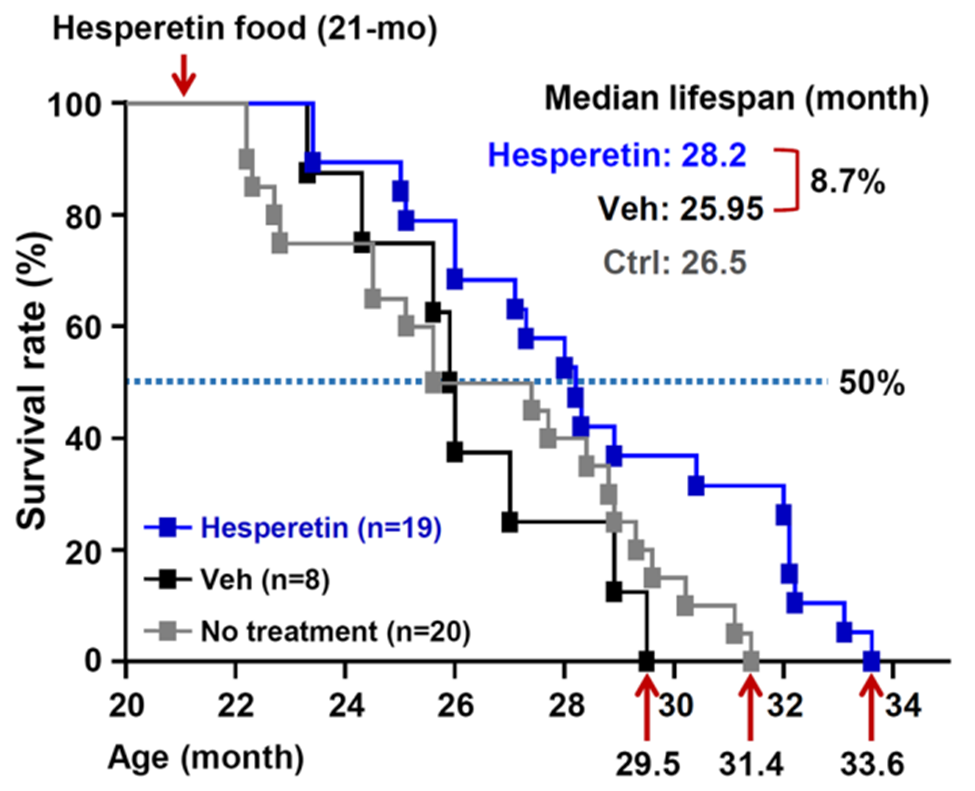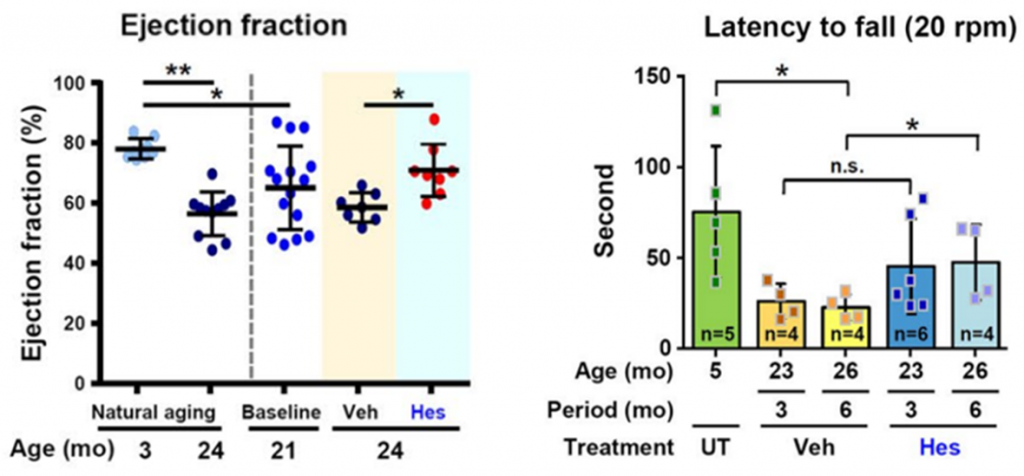Key Points:
- The lifespan of naturally aged mice is increased by hesperetin supplementation.
- Hesperetin supplementation reverses signs of skeletal muscle and cardiac aging.
Our genetic blueprints (DNA) are constantly being studied to identify longevity-linked genes and pathways that may hold the key to prolonging our lifespan. One particular gene that has strong ties to longevity is Cisd2. In addition to extending the lifespan of rodents through increased activity, activation of Cisd2 protects against cardiac dysfunction and muscle degeneration, two hallmarks of aging. Given Cisd2’s ability to delay critical features of aging, researchers are exploring whether natural compounds can turn on Cisd2 to trigger its longevity-boosting effects.
Researchers in Taiwan report in the Journal of Biomedical Science that hesperetin can activate Cisd2 with no observable toxicities in rodents. Supplementing aged 21-month-old mice (equivalent to nearly 70 human years) with hesperetin increases their median lifespan by ~9% and maximum lifespan by ~14%. What’s more, the findings show that hesperetin supplementation delays cardiac and skeletal muscle aging, corroborating previous findings of Cisd2 activation exerting similar protective effects.
Hesperetin Prolongs Lifespan
Cisd2 levels decline with aging, contributing to shortened lifespan. To examine whether hesperetin can restore Cisd2 levels and increase lifespan, the investigators orally supplemented old mice with hesperetin (100 mg/kg/day) and tracked their survival rate. Results showed that hesperetin moderately increased the maximum lifespan (~14%) and slightly increased the median lifespan (~9%) of these mice. Notably, Cisd2 levels were significantly higher in the skeletal and cardiac muscles of treated aged mice, indicating that hesperetin can restore naturally declining Cisd2 levels upon aging. Taken together, the findings suggest that hesperetin can potentially prolong lifespan through Cisd2 regulation.

Hesperetin Protects the Heart and Skeletal Muscle Upon Aging
As we age, our bodies are swarmed with debilitating age-related abnormalities, including cardiac dysfunction and progressive loss of muscle mass and strength (sarcopenia), both of which contribute to early causes of mortality. However, given that studies demonstrate that increased Cisd2 activity protects against cardiac dysfunction and delays skeletal muscle aging, the investigators sought to find if hesperetin could exert similar protective effects.
First, following hesperetin supplementation, investigators quantified the amount of blood pumped from the heart (ejection fraction), which is vital for oxygen delivery to our organs. Results showed that older mice treated with hesperetin exhibited a higher ejection fraction percentage than untreated mice and vehicle-treated mice, indicating that hesperetin improves cardiac function upon aging.
Next, the taiwanese researchers conducted a rotor rod test to investigate muscle function following hesperetin treatment. Although untreated young mice took the longest to fall off the rotating rod, hesperetin-treated mice came second and significantly outperformed older mice not treated with hesperetin. Interestingly, hesperetin-treated mice also displayed the least skeletal muscle degeneration. Overall, the findings show that hesperetin delays key features of aging and corroborates previous studies linking Cisd2 activation and improved cardiac/muscle function upon aging.

Hesperetin: Activator of the Cisd2 Longevity Gene
The science surrounding the search for natural Cisd2 activators is still in its infancy. That being said, overwhelming evidence supports the link between Cisd2 activation and longevity. Additionally, research shows that Cisd2 activation attenuates liver aging as well as the age-related functional decline of our cellular powerhouses, the mitochondria, which further contributes to the structural integrity and maintenance of our organs. Whether hesperetin can exert similar anti-aging effects in humans remains unclear. Nevertheless, the findings of this study highlight hesperetin’s potential to boost longevity via Cisd2 activation.
“It will be of great interest to develop hesperetin as a medicinally or nutritionally functional food for preventive purposes related to extending healthy lifespan and/or therapeutic purpose related to treating age related diseases,” conclude the authors of the study.